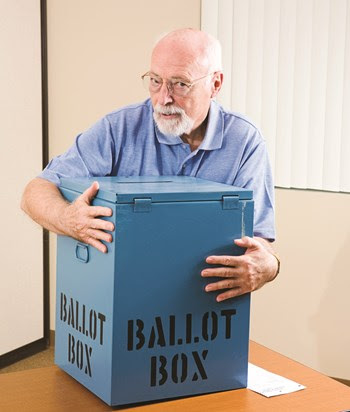
Are you a property manager or an active member of a Florida Association? Like most Florida communities, you may experience that participation and turn-out during elections is likely low, as owners are either disengaged, live abroad or feel alienated by the current cumbersome analog voting process. Passing a motion and getting projects approved, even when a low quorum of 20% is needed, seems like an impossible task for many associations, let alone implementing changes for large projects that require a higher turn-out. And when motions do pass, often, it is because a few active group of owners participated, deciding for everyone else – a silent disgruntled majority – who as a result, in many cases, end up feeling even more alienated. Here are 5 important decision areas where increased owner participation methods, like online voting, could help get more owners involved:
-
Directors
The whole body of members should decide the board of directors of your association by vote. The directors of an Association have a tremendous amount of unpaid responsibilities including:
- Imposing requirements of the declaration, articles, and regulations for the ownership and management of the development.
- Creating rules of operation for the common areas and facilities
- Managing disciplinary proceedings against members of the association for rule violations.
- Paying taxes and assessments
- Contracting for insurance on behalf of the association.
- Contracting for goods or services for the common areas or for the association.
- Assigning powers to any committees, officers, or employees of the association as sanctioned by the governing documents.
- Making budgets and financial statements for the association.
Without inclusive and truly representative election, these huge decisions will be almost completely up to a board elected by a just few active group of owners and not by the majority.
-
Budgets
The budgets and reserves an association creates and keeps is decided collectively. They decide if the maintenance fee increases or not, and how large the association fund needs to be. When only a small percentage of members vote on financial matters the decisions clearly represent the interests of only a small percentage of the body. This can negatively affect the experience and satisfaction of an owner because having to comply with unforeseen fees dictated by a new board, selected by a few, can appear as a bitter surprise and change the whole game for some.
-
Rules & Regulations
Condo and HOA boards have the final word on what owners can keep on balconies, imposing fees on unit owners for breaking rules, rules on pets, and general guidelines on how residents should behave in common areas. The control can go as far as deciding what fertilizers, pesticides, sprinkler systems and whatever else it takes to keep your lawn picture-perfect. A board may or may not allow environmentally friendly forms of landscaping and may limit the size of gardens, ban compost piles and prevent owners from installing solar panels. Keep in mind that all owners have to pay for maintaining common areas whether they use them or not. Associations decide the hours for amenities like pools and tennis courts and have rules, some loose some severe, about how many guests can use common facilities. Think about it… all these rules without many of the unit owners having a say? Risky business.
-
Construction/Remodeling
Any construction, remodeling, or purchase on or for the premises is discussed in association meetings. The prices of such are also reviewed and approved during meetings. Associations decide when community areas, amenities, lobby, and landscaping needs an upgrade. All decisions hold a price tag to them that are later billed to each one of the members of the community. Even if an owner does not vote they are still responsible for the charges.
-
Assignment and change of providers
Lastly, the board decides who are the providers for all the services of the property, including lawyers, maintenance, valet, management, amenities, security, construction and remodeling of the community. During association meetings the list of providers are discussed and picked collectively by the group. The choice of providers alters the overall community living experience, the value of homes, how safe residents feel, and much more.
Analogue and tedious voting processes keeps many homeowners from participating in the decision-making process of their association. Voting in association matters is an important responsibility that helps to build a happier and more engaged community. When everyone feels welcome to participate and make their voices heard, from anywhere, securely and in a simple way, making participating a no-brainer, everyone in the community wins.One solution that is gaining traction is online voting software or mobile apps, such as the platform provided by local-to-South-Florida company, ONR (pronounced “owner”). [Contact ONR at 888-362-8711 or at he***@****pp.com].
Their platform allows condo or homeowners to vote on key issues on their own schedules and aims to make it easier for owners to be fully involved with the Association’s decisions without having to deal with cumbersome ballots or even attend board meetings. The software platform is simple to use from a smartphone or tablet, secure and fully compliant with Florida laws. It allows the owners to access notices, ballots, surveys and most importantly to vote in all Association elections.
Last year, Florida’s Legislature responded to this thought by authorizing Florida condominium associations to conduct elections through Internet-based online voting systems. As with any new law, questions quickly arose regarding the implementation. Homeowners associations are carefully watching this process because it is likely that what works for condominium associations will be applied in the future to homeowners associations.The Department of Business and Professional Regulation’s Division of Florida Condominiums, Timeshares, and Mobile Homes published a proposed rule change to Florida Administrative Code Rule 61B-12.0021, entitled “Regular Elections; Vacancies Caused by Expiration of Term, Resignations, Death; Election Monitors,” and Rule 61B-23.00211 entitled “Electronic Voting.” This firm provided the Division with suggestions to improve the proposal, many of which were adopted.
As revised, Proposed Rule 61B-23.0021 provides that if electronic voting is authorized for condominium associations, then the first notice of election must include: (1) the procedure to consent to electronic voting; and (2) the deadline to consent to electronic voting.
Proposed Rule 61B-23.00211 is a new addition to the administrative rules and provides guidance to Florida condominium associations with regard to the definition of an election official and what a directors’ resolution authorizing electronic voting should include. A resolution to authorize electronic voting must provide that upon electronic voting authorization, all unit owners must be provided notice of the option to vote electronically, and the notice of meeting must indicate that unit owners may vote electronically. The rule also specifies that a written consent to electronic voting may be provided by e-mail without the e-mail address being considered an official record.
The term “election officials” is defined as the division, ombudsman, and election monitors appointed by the ombudsman. With regard to the electronic voting systems, the system must provide:- The association with an official record that includes the votes cast, and the date and time the vote was received; and
- The unit owner a receipt that includes the vote cast, the date and time of submission, and the user identification.
For elections, votes cannot be accessible to the condominium association before the scheduled election.
Thanks to new technology, voter apathy might be solvable after all!
